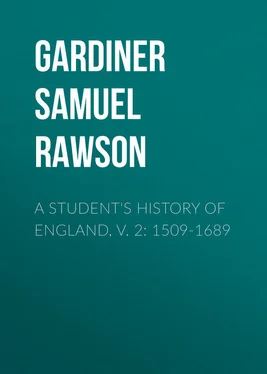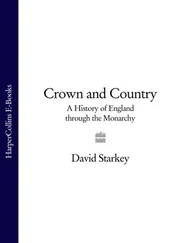Samuel Gardiner - A Student's History of England, v. 2 - 1509-1689
Здесь есть возможность читать онлайн «Samuel Gardiner - A Student's History of England, v. 2 - 1509-1689» — ознакомительный отрывок электронной книги совершенно бесплатно, а после прочтения отрывка купить полную версию. В некоторых случаях можно слушать аудио, скачать через торрент в формате fb2 и присутствует краткое содержание. Издательство: Иностранный паблик, Жанр: История, foreign_antique, foreign_prose, на английском языке. Описание произведения, (предисловие) а так же отзывы посетителей доступны на портале библиотеки ЛибКат.
- Название:A Student's History of England, v. 2: 1509-1689
- Автор:
- Издательство:Иностранный паблик
- Жанр:
- Год:неизвестен
- ISBN:нет данных
- Рейтинг книги:3 / 5. Голосов: 1
-
Избранное:Добавить в избранное
- Отзывы:
-
Ваша оценка:
- 60
- 1
- 2
- 3
- 4
- 5
A Student's History of England, v. 2: 1509-1689: краткое содержание, описание и аннотация
Предлагаем к чтению аннотацию, описание, краткое содержание или предисловие (зависит от того, что написал сам автор книги «A Student's History of England, v. 2: 1509-1689»). Если вы не нашли необходимую информацию о книге — напишите в комментариях, мы постараемся отыскать её.
A Student's History of England, v. 2: 1509-1689 — читать онлайн ознакомительный отрывок
Ниже представлен текст книги, разбитый по страницам. Система сохранения места последней прочитанной страницы, позволяет с удобством читать онлайн бесплатно книгу «A Student's History of England, v. 2: 1509-1689», без необходимости каждый раз заново искать на чём Вы остановились. Поставьте закладку, и сможете в любой момент перейти на страницу, на которой закончили чтение.
Интервал:
Закладка:
CHAPTER XXV
THE BREACH WITH THE PAPACY. 1527-1534
• Henry seeks for a divorce 1527
• His suit before a Legatine Court 1529
• Fall of Wolsey 1529
• The clergy acknowledge Henry to be Supreme Head of the Church of England 1531
• The first Act of Annates 1532
• The king's marriage to Anne Boleyn and the Act of Appeals 1533
• Cranmer's sentence of divorce 1533
• The final separation from Rome 1534
1. The Papacy and the Renascence.– The Renascence alone could not make the world better, and in many respects it made it worse. The respect which it paid to humanity, which was its leading characteristic, allied itself in More with a reverence for God, which led him to strive to mellow the religious teaching of the Middle Ages, by fitting it for the needs of the existing world. Too many threw off all religious restraints, and made it their first thought to seek their own enjoyment, or the triumphs of their own intellectual skill. Sensual delights were pursued with less brutal directness, but became more seductive and more truly debasing by the splendour and gracefulness of the life of which they formed a part. In Italy the Popes swam with the current. Alexander VI. ( 1492-1503) gave himself up to the most degrading vices. Julius II. ( 1503-1513) was a passionate warrior struggling for the extension of his temporal possessions. Leo X. ( 1513-1521) was a polished lover of art, perfectly indifferent to religious duty. "Let us enjoy the Papacy," he said when he was elected, "since God has given it to us." Amidst the lust of the flesh, the lust of the eyes, and the pride of life, the Popes became as other Italian princes, no better and no worse. Spiritual guidance was no longer to be expected of them.
2. Wolsey and the Papacy.– By Wolsey and his master the Papacy was respected as a venerable and useful institution, the centre of a religious organisation which they believed to be of divine origin, though when it came in conflict with their own projects they were quite ready to thwart it. In 1521Leo X. died, and Wolsey, having some hopes of being himself elected, asked Charles V. to send troops to compel the cardinals to choose him, promising to pay the expenses of the armament. Charles, though, in the previous year, he had offered to support Wolsey's candidature at the next vacancy, now deserted him, and the new Pope was Adrian VI., who in 1523was succeeded by Clement VII. (see p. 374).
3. Wolsey's Legatine Powers.– It is unlikely that Wolsey was much disappointed. His chief sphere of action was England, where since 1518he had held unwonted authority, as in that year he had been appointed Legate a latere 1by Leo X. at Henry's request, and the powers of a Legate a latere were superior even to those of Warham, the Archbishop of Canterbury. Wolsey was therefore clothed with all the authority of king and Pope combined. His own life was, indeed, like those of many churchmen in his day, very far from the ideal of Christianity; but for all that he had that respect for religious order which often lingers in the hearts of men who break away from the precepts of religion, and he was too great a statesman to be blind to the danger impending over the Church. The old order was changing, and Wolsey was as anxious as More, though from more worldly motives, that the change should be effected without violence. He knew that the Church was wealthy, and that wealth tempted plunderers, and he also knew that, with some bright exceptions, the clergy were ignorant, and even when not absolutely dissolute were remiss and easy-going in their lives. He was, therefore, anxious to make them more worthy of respect, and, with the consent of king and Pope, he began in 1524to dissolve several small monasteries, and to apply their revenues to two great colleges, the one founded by him at Oxford and the other at Ipswich. He hoped that without any change of doctrine or organisation the Church would gradually be purified by improved education, and would thus once more command the respect of the laity.
4. Henry VIII. and the Clergy.– With Wolsey's object Henry, being himself well educated and well read, fully sympathised. For many years there had been a tacit understanding between the king and the Pope, and now that both the king and the Pope supported Wolsey's action there seemed to be less danger than ever of any disturbance of the friendly relations between Church and State. Yet though Henry was on good terms with the Pope, he had made up his mind that whenever there was a conflict of jurisdiction in ecclesiastical matters his own will, and not that of the clergy, was to be predominant. As early as in 1515, when a question of this kind was moved, Wolsey asked on behalf of the clergy that it might be referred to the Pope. "We," said Henry proudly, "are by God's grace king of England, and have no superior but God; we will maintain the rights of the crown like our predecessors; your decrees you break and interpret at your pleasure, but we will not consent to your interpretation of them any more than our predecessors have done." Henry VIII., in short, took up the position which Henry II. had assumed towards the clergy of his day, and he was far more powerful to give effect to his views than Henry II. had ever been. Such an act of self-assertion would probably have caused a breach with the great Popes of the middle ages, such as Gregory VII. or Innocent III. Leo X. was far too much a man of the world to trouble himself about such matters.
5. German Lutheranism.– Before many years had passed the beginnings of a great religious revolution which appeared in Germany served to bind Henry and Leo more closely together. Martin Luther, a Saxon friar, had been disgusted by the proceedings of a hawker of indulgences, who extracted small sums from the ignorant by the sale of the remission of the pains of purgatory. What gave world-wide importance to Luther's resistance was that he was not only an eloquent preacher of morality, but the convinced maintainer of a doctrine which, though not a new one, had long been laid aside. He preached justification by faith, and the acceptance of his teaching implied even more than the acceptance of a new doctrine. For centuries it had been understood that each Christian held intercourse with God through the sacraments and ordinances of the Church. His individuality was, as it were, swallowed up in the vast community to which he belonged. Luther taught each of his hearers that the important thing was his faith, that is to say his immediate personal relation with God, and that the intervention of human beings might, indeed, be helpful to him, but could be no more. Such a doctrine touched all human activity. The man who in religion counted his own individual faith as the one thing necessary was likely to count his own individual convictions in social or political matters as worth more to him than his obedience to the authority of any government. In Luther's teaching was to be found the spirit of political as well as of religious liberty. This side of it, however, was not likely to reveal itself at once. After a time Luther shook off entirely the claims of the Papacy upon his obedience, but he magnified the duty of obeying the princes who gave him their support in his struggle with the Pope.
6. Henry's Controversy with Luther.– Luther, when once he was engaged in controversy with the Papacy, assailed other doctrines than those relating to justification. In 1521Henry, vain of his theological learning, wrote a book against him in defence of the seven sacraments. Luther, despising a royal antagonist, replied with scurrilous invective. Pope Leo was delighted to have found so influential a champion, and conferred on Henry the title of Defender of the Faith. If Henry had not been moved by stronger motives than controversial vanity he might have remained the Pope's ally till the end of his life.
Читать дальшеИнтервал:
Закладка:
Похожие книги на «A Student's History of England, v. 2: 1509-1689»
Представляем Вашему вниманию похожие книги на «A Student's History of England, v. 2: 1509-1689» списком для выбора. Мы отобрали схожую по названию и смыслу литературу в надежде предоставить читателям больше вариантов отыскать новые, интересные, ещё непрочитанные произведения.
Обсуждение, отзывы о книге «A Student's History of England, v. 2: 1509-1689» и просто собственные мнения читателей. Оставьте ваши комментарии, напишите, что Вы думаете о произведении, его смысле или главных героях. Укажите что конкретно понравилось, а что нет, и почему Вы так считаете.












